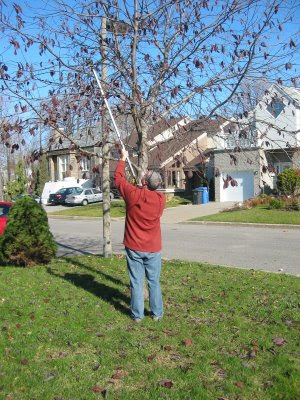feeds on the branches, eventually disfiguring trees.
This disease can occur on both sweet
and sour cherry, wild cherries and plum trees.
The disease black knot is caused by the fungus
(Apiosporina morbosa) .
The Black knot fungus infects trees
between April and June during warm,
wet weather. The first symptom is a small,
light brown swelling on the
current or last year’s growth.
These swellings are difficult to notice
at first until the following spring when
they enlarge and appear as an
olive green velvety knot.
During this stage the fungus produces
spores which are released at or near
the time the trees are beginning to leaf.
Spore release is heaviest at blossom time.
Soon after, the knots become darker
and by fall, they appear as the black
knots that are atypical of the symptoms.
The disease may not be recognized
until one or two years after
the original infection.
Knots will continue to grow until
they girdle the branch and kill it.
Severe infections can eventually kill the tree.
Many pieces of fungus, --
approx. 10 were cut from the tree.








No comments:
Post a Comment
Thanks for visiting my blog. I love all your thoughts and comments.